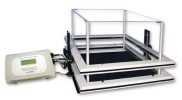Authors
C. Cederroth, M. Vinciguerra, F. Kühne, R. Madani, D. Doerge.
Lab
University of Geneva, Department of Genetic Medicine and Development and National Center for Competence in Research - Frontiers in Genetics, Geneva, Switzerland.
Journal
Environ Health Perspect.
Abstract
Background: Obesity is an increasingly prevalent health problem, and natural effective therapeutic approaches are required to prevent its occurrence. Phytoestrogens are plant-derived compounds with estrogenic activities; they can bind to both estrogen receptors _ and _ and mimic the action of estrogens on target organs. Objectives: The purpose of this study was to examine the influence of soy-derived phytoestrogens on energy balance and metabolism. Methods: Male outbred mice (CD-1) were allowed ad libitum access to either a high soy-containing diet or a soy-free diet from conception to adulthood. We measured circulating serum isoflavone levels using reverse-phase solid-phase extraction for subsequent liquid chromatography electrospray tandem mass spectrometry analysis. Adult animals were analyzed for body composition by dual-energy X-ray absorptiometry, locomotor activity by running-wheel experiments, respiratory exchange rate by indirect calorimetry, and food intake using metabolic cages. Quantitative reverse transcriptase-polymerase chain reaction was performed to determine the expression of hypothalamic neuropeptide genes. Results: We found that adult mice fed a soy-rich diet had reduced body weight, adiposity, and resistance to cold. This lean phenotype was associated with an increase in lipid oxidation due to a preferential use of lipids as fuel source and an increase in locomotor activity. The modulation of energy balance was associated with a central effect of phytoestrogens on the expression of hypothalamic neuropeptides, including agouti-related protein. Conclusion: The data suggest that dietary soy could have beneficial effects on obesity, but they also emphasize the importance of monitoring the phytoestrogen content of diets as a parameter of variability in animal experiments.
BIOSEB Instruments Used:
Infrared Actimeter (LE8815)

 Pain - Thermal Allodynia / Hyperalgesia
Pain - Thermal Allodynia / Hyperalgesia Pain - Spontaneous Pain - Postural Deficit
Pain - Spontaneous Pain - Postural Deficit Pain - Mechanical Allodynia / Hyperalgesia
Pain - Mechanical Allodynia / Hyperalgesia Learning/Memory - Attention - Addiction
Learning/Memory - Attention - Addiction Physiology & Respiratory Research
Physiology & Respiratory Research
 Pain
Pain Central Nervous System (CNS)
Central Nervous System (CNS) Neurodegeneration
Neurodegeneration Sensory system
Sensory system Motor control
Motor control Mood Disorders
Mood Disorders Other disorders
Other disorders Muscular system
Muscular system Joints
Joints Metabolism
Metabolism Cross-disciplinary subjects
Cross-disciplinary subjects Happy new year 2025
Happy new year 2025 